Home Learning
"Homework has a positive impact on average (+ 5 months), particularly with pupils in secondary schools."
- Research from The Education Endowment Foundation
This area of our school website is dedicated to our approach to Home Learning, including our Home Learning Schedule (when your child should receive their Home Learning) and the Home Learning Support Sessions (detentions and support for those who need it).
Home Learning is set because it not only reinforces classroom learning but also helps young people to develop skills and attitudes they need for successful lifelong learning. It supports the development of independent learning skills, including the habits of enquiry and investigation.
At The Adeyfield Academy, Home Learning is an integral part of the curriculum; it is planned and prepared alongside all other programmes of learning. Home Learning tasks are selected ensuring they are appropriate to the age, ability and circumstances of the students. All Home Learning is recorded on Google Classroom. In addition to Home Learning information, you can also view your child's attendance and behaviour points awarded through our behaviour and communications monitoring system, Edulink. Students should also be documenting their Home Learning in their journals.
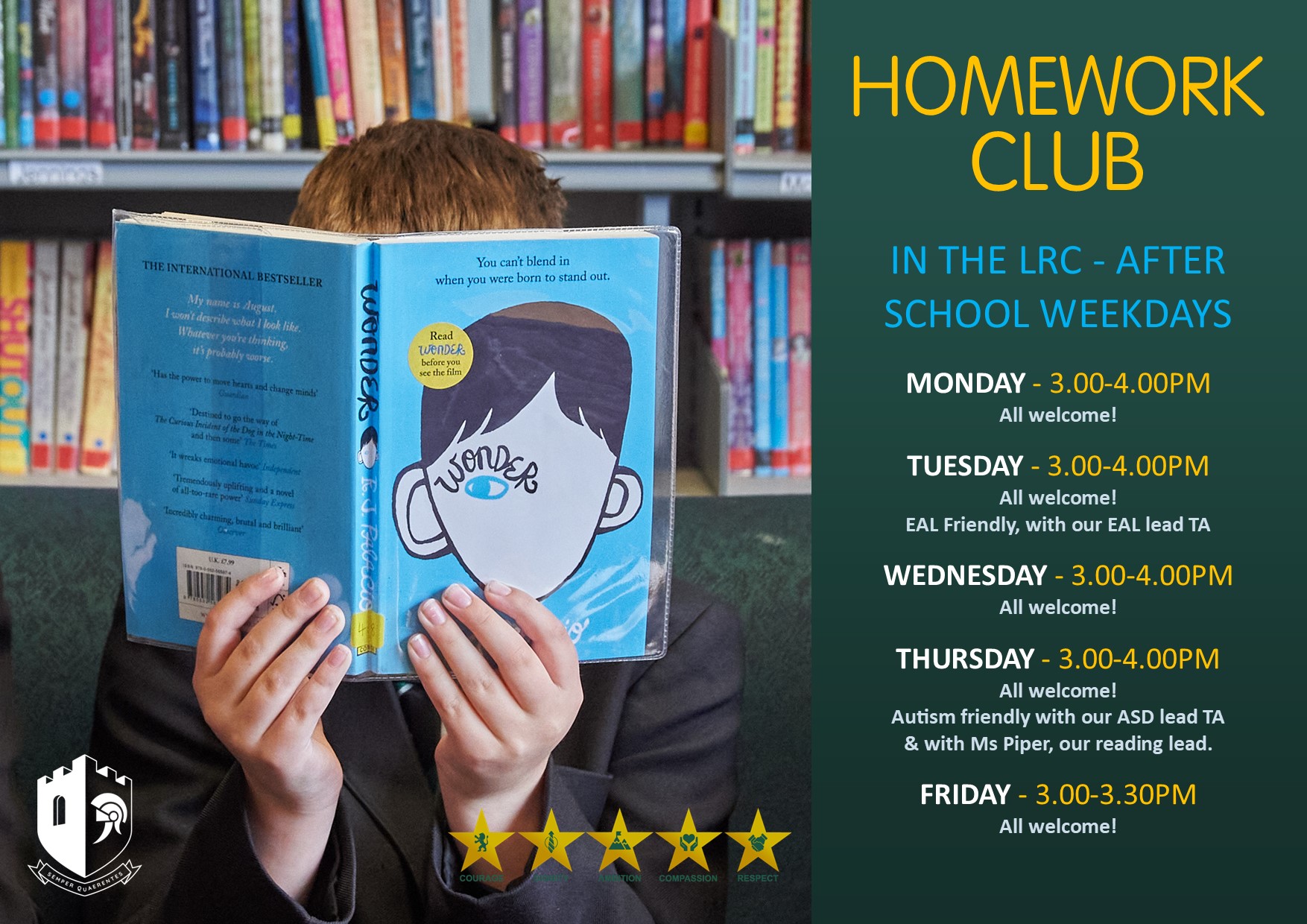
Home Learning by Subject
Art
In Art home learning projects are set half termly. These projects rely on creating a piece of artwork in relation to a theme or artist and are often a written element to either analyse or educate on the theme or artist as well. In addition we set home learning to complete classwork if it is incomplete to allow the work to show the students best ability and occasionally ask them to find and bring in reference images for projects. Due to restraints on space and materials we offer Art Catch-up sessions on Tuesdays and Thursdays until 5pm after school if students need.
Business
KS4: GCSE Business homework is closely tied to GCSE preparation.
It includes tasks such as learning key vocabulary, reading, researching, revising,maintaining comprehensive and up-to-date notes and practising exam-style questions.
Additionally, students may be tasked with creating revision resources and watching business-related television programmes. Students will need to make use of Seneca Learning, Quizlet and the AQA website as platforms for revision and learning vocabulary. Students who do not have access to ICT at home are able to use school facilities. Students will usually receive one piece of homework a fortnight which should take approximately 60 minutes to complete. Students are usually given a week, although it may be slightly shorter depending on timetabling.
Computer Science
KS4: GCSE Computer Science homework is closely tied to GCSE preparation.
It includes tasks such as learning key vocabulary, reading, researching, revising,maintaining comprehensive and up-to-date notes and practising exam-style questions.
Additionally, students may be tasked with creating revision resources and watching computer science-related television programmes. Students will need to make use of Seneca Learning, Quizlet and the OCR website as platforms for revision and learning vocabulary. Students who do not have access to ICT at home are able to use school facilities. Students will usually receive one piece of homework a fortnight which should take approximately 60 minutes to complete. Students are usually given a week, although it may be slightly shorter depending on timetabling.
D.T.
KS3: Pupils are set fortnightly homework tasks which include research tasks, creating design ideas and developing further knowledge.
In Food Technology students will be asked to practise dishes and develop cooking skills at home.
KS4: Pupils are set knowledge based revision homeworks. Students will complete exam practice and revision tasks through Seneca, as well other revision based activities.
English
In English at Key Stage 3, homework is set weekly. On Week A students are instructed to select a creative task from their home learning menus. These tasks are linked to the topic being studied in class. On Week B, students are set assignments on Literacy Planet - an online platform that supports the development of literacy skills.
At Key Stage 4, students are set weekly tasks based upon what they have been studying in class by their individual class teacher. These may be reading, research, written or revision tasks.
Geography
KS3: Students are set regular tasks each fortnight in a variety of formats to encourage students to be creative and to support revision. This can be done fortnightly.
KS4: Students are set exam practice and revision tasks through Seneca, as well other revision based activities.
History
In History we provide students with a home-learning menu for each unit, which is stuck in the student's book and on their Edulink. On this menu they have several different options to choose from for their home-learning task. These tasks vary from 'meanwhile elsewhere' sheets, museum entry tasks, timelines and several other options. This means students can choose a task that they are most interested in, and once completed, students can sign and date the task that they have done.
Maths
In Maths we set home learning for both Key Stage 3 and 4 every week on a Friday through a website called Sparx Maths. Sparx maths is a website which uses AI to set you individualised questions, based on topics that you have been studying. Sparx maths uses your past answers to determine what level you are at and how best to challenge you with questions which will take approximately one hour.
Music
KS3: Home learning is not set exclusively as we would prefer students to utilise their time to attend extra-curricular clubs.
KS4: Students are expected to rehearse their instrument/voice outside of school in preparation for 30% of the course. Students will also complete some knowledge-based recall and listening tasks throughout the course.
Performing Arts
KS3: Home learning is not set exclusively as we would prefer students to utilise their time to attend extra-curricular clubs.
KS4: Students have a variety of different tasks throughout the course such as learning lines/choreography, researching certain styles and texts target setting, reviewing own performances, and analysing the work of practitioners. All their work is completed through assignments on google classroom.
P.E.
KS3: Home learning is not set exclusively as we would prefer students to utilise their time to attend extra-curricular clubs. For KS3 students we on occasion set blended learning tasks utilising video observations and reviewing knowledge organisers.
KS4: As students study in our GCSE Physical education or WJEC Sport and coaching principles courses, they will expect to be set homework once a week. These tasks may include recall tasks, exam questions or research tasks.
Science
KS3: Seneca tasks 1 per fortnight, content based on the current topic.
KS4: Seneca 1 per week. Retrieval questions from the whole GCSE content.
Spanish
KS3: In Spanish we set home learning once a fortnight through a website called Languagenut. Languagenut is a platform that provides a range of interactive activities for students to practise and memorise key Spanish vocabulary and phrases. Assignments will take approximately 40 minutes to complete. Students are also able to access activities that have not been specifically set for home learning, should they wish to challenge themselves further.
KS4: In Spanish we set home learning weekly through a website called Languagenut. Languagenut is a platform that provides a range of interactive activities for students to practise and memorise key Spanish vocabulary and phrases. This includes vocabulary and grammar directly taken from the exam board set lists. Assignments will take approximately 1 hour to complete. Students are also able to access activities that have not been specifically set for home learning, should they wish to challenge themselves further.
Years 7 - 9
Each subject has a programme of Home Learning tasks linked to the programme of study. Home Learning can be completed at home but can also be completed at school. The Learning Resource Centre (LRC), for example, is open daily, and we have an after-school Home Learning Club available. In addition, many departments will organise after-school and lunchtime study sessions to help students with their studies.
Home Learning for Years 7-9 will be set as given by each faculty policy.
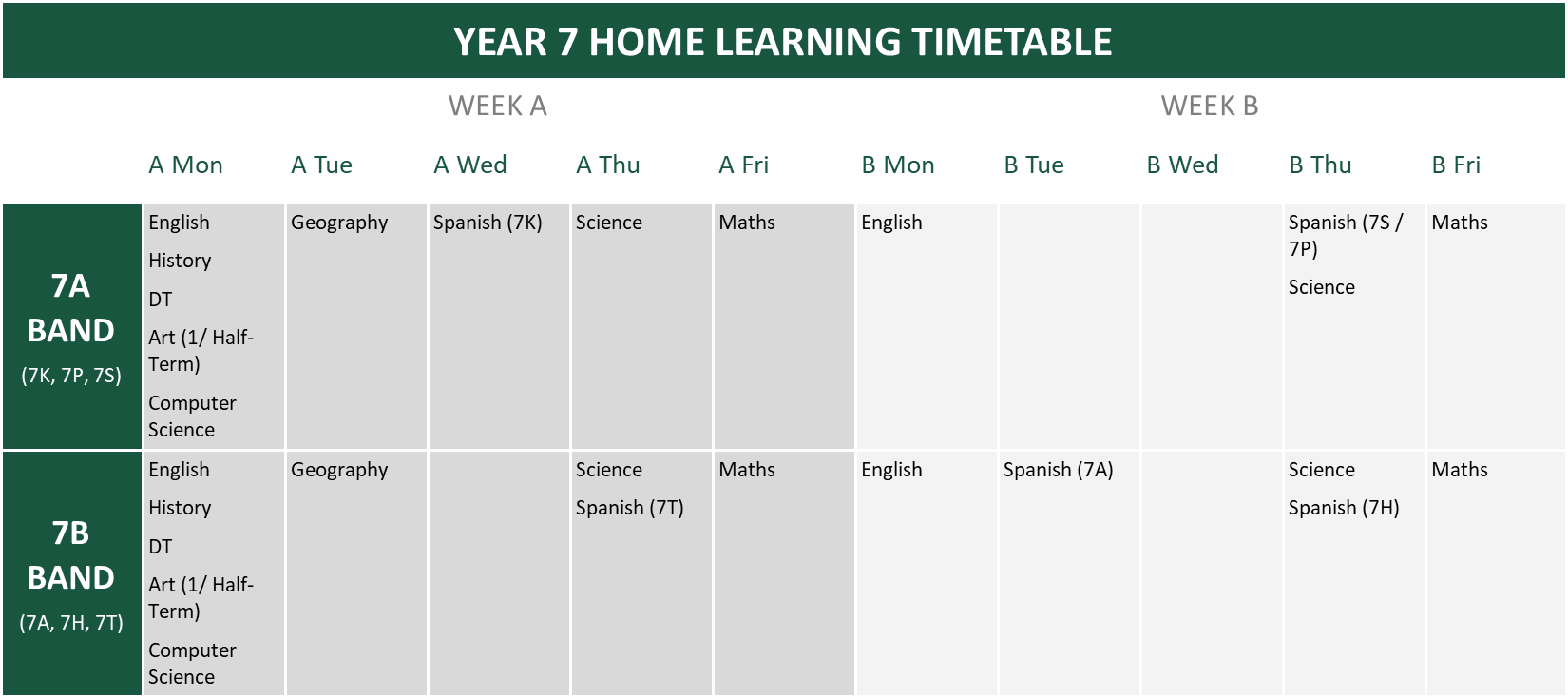
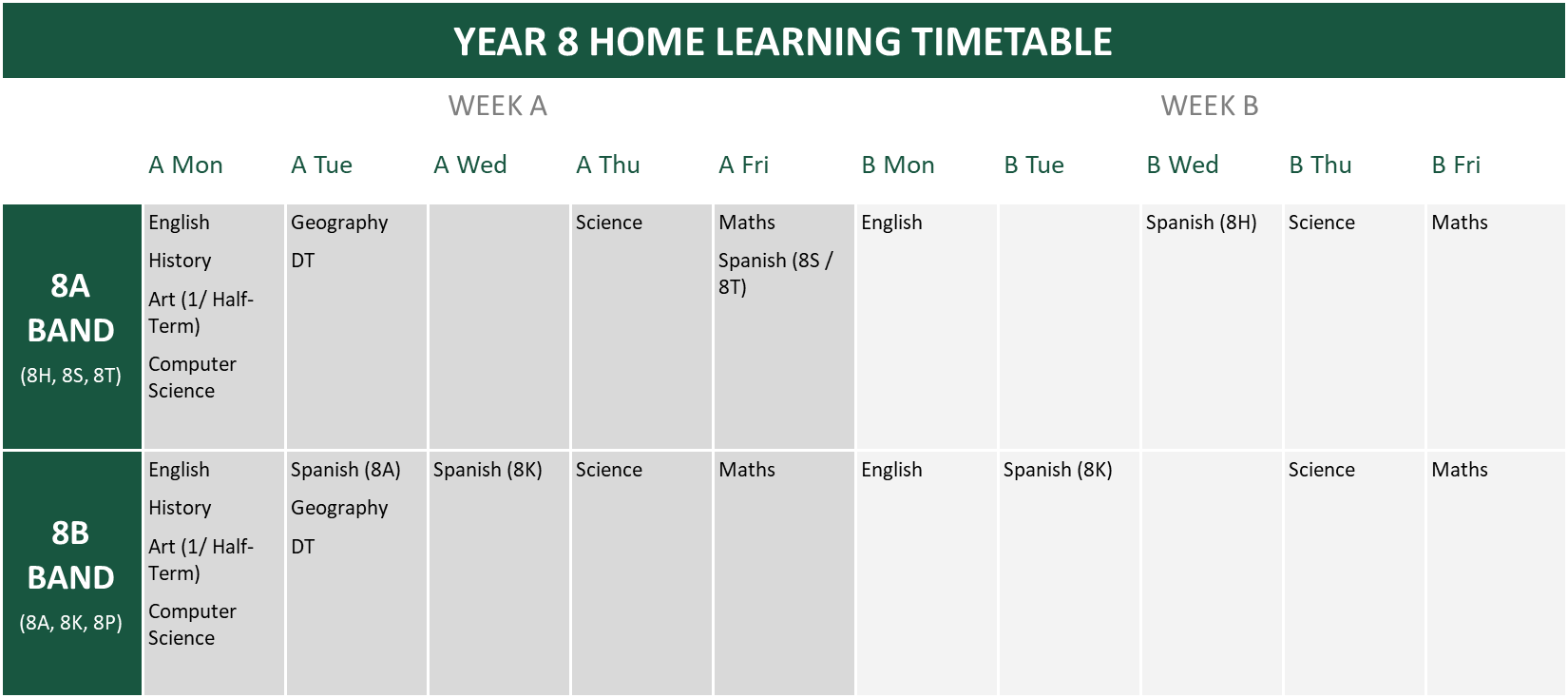
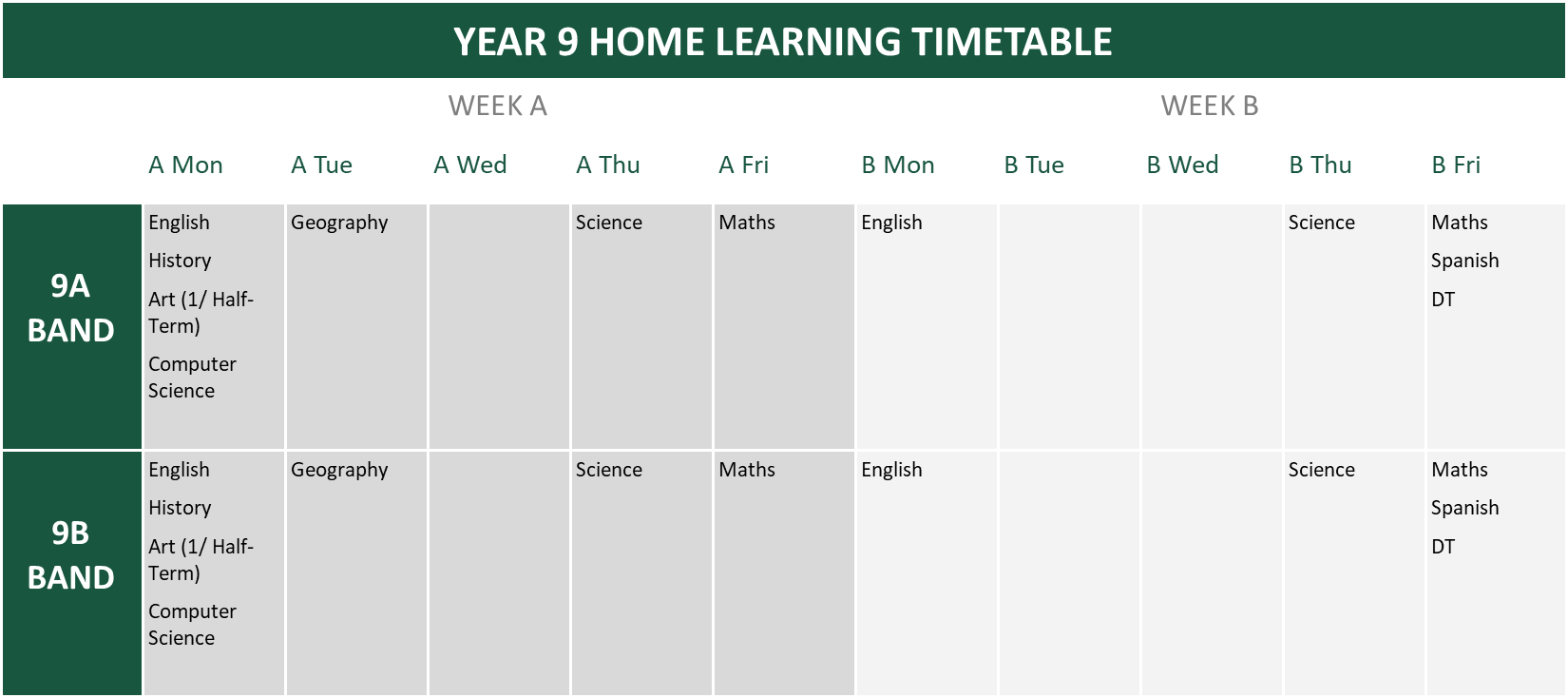
Years 10 - 11
For Years 10 - 11, examination subjects will set one Home Learning task per week. Each will take up to 60 minutes to complete.
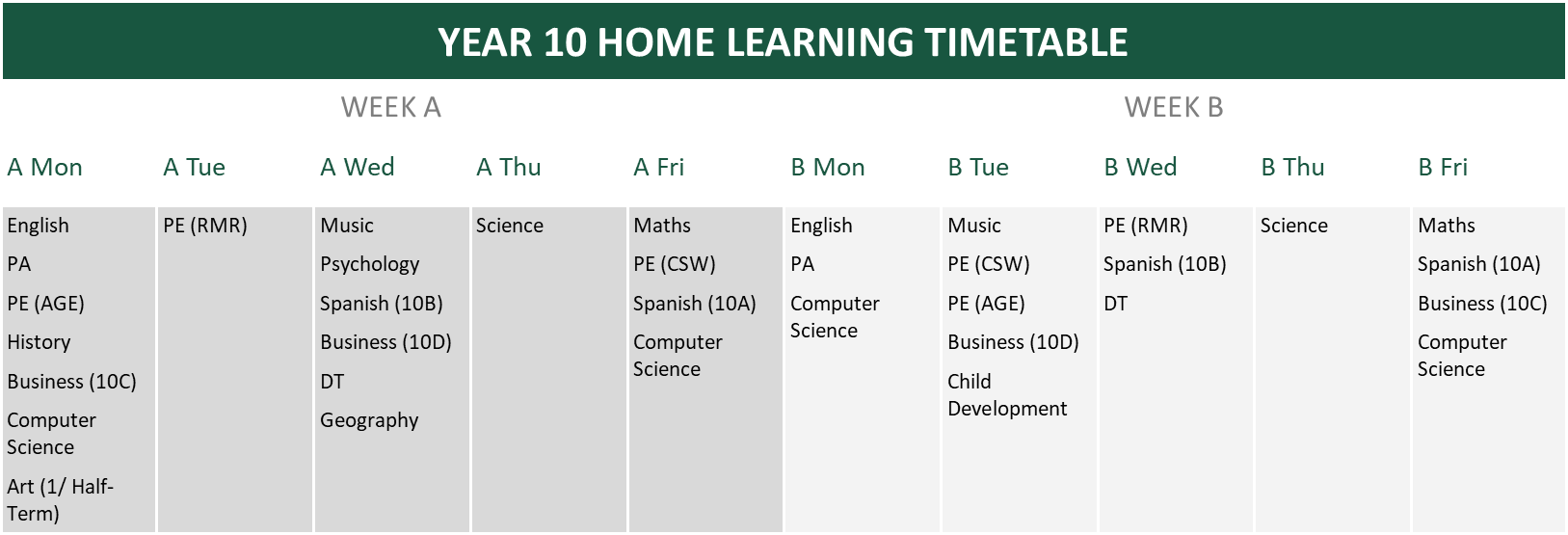
![]()
Years 12 -13
Post 16 courses impose greater demands than GCSEs and a need for flexible approaches to Home Learning. Students will be expected to record Home Learning/preparation set and to spend about three hours of Home Learning per day.